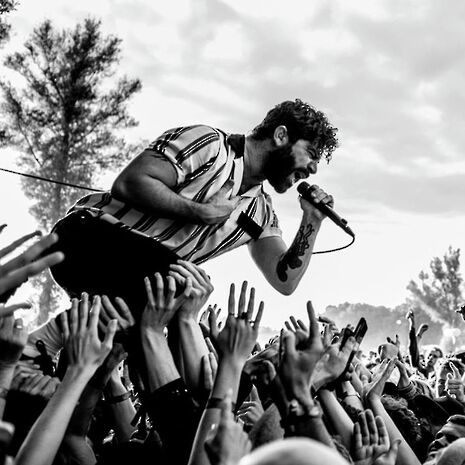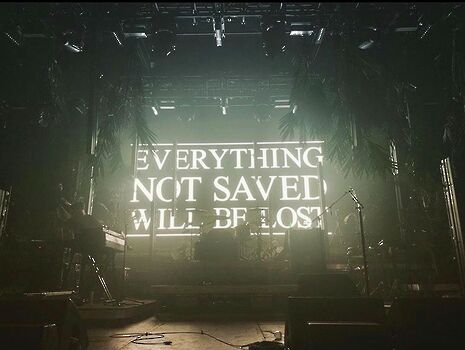Foals: Everything not saved will be lost – Part 2
Eddie Milton-Seall reviews the second part of Foal’s two-piece project and delves deeper into why this album should hold particular prominence today
“Everything Not Saved Is Lost Part 2” is the second part of the band’s most ambitious project to date. After the success of “Part 1”, many critics questioned not only the necessity, but also potential quality of a second album released within the next six months. The frantic disobedience imbedded within his album juxtaposes “Part 1” brilliantly, it is a sequel we never knew we wanted. Yannis describes “Part 1” as “more from the perspective of viewing what’s going on, whereas “Part 2” is on the run.” On the run from what? It may not be clear from first glance; the album highlights such a variety of current issues, it can be difficult to understand its overarching message.
The new album is littered with distinctive and interesting imagery. The opener Red Desert is a beautiful and brave instrumental. Its ‘Clockwork Orange’ inspired mystery contrasts with the defiance and absolutism of Sunday at the end of Part 1. The album swiftly lifts into The Runner - which I’m now convinced is one of their best songs to date - with closed throat falsettos creating a unique and genuine feeling of pain and desperation. This, combined with the gospel raising aura produced by the drums and baseline, means this song captures your imagination and attention immediately. The album continues with this chaotic, confused rock sound, calling back to the uncompromising nature of their first LP Antidotes. Almost twelve years on, songs such as Black Bull and Wash off have the same energy as Antidotes but convey a much more nuanced structure. They feel like the twisted cousin of hits Inhaler and What Went Down; whereas Like Lightening would feel more at place in a Black Keys LP rather than on this record - a definite blip.
"The ambition of this project was criticised as pretentious, however the connections between the two albums are well reasoned and, perhaps more importantly, subtle."
For me, 10,000 Feet is the albums crowning glory. Philippakis mutates his voice to howl and scream about finally becoming at one with nature post death, all whilst the band produces an aggressive eeriness. Together this creates a feeling of personal inadequacy which is so prevalent today as a result of the UK’s current environmental issues. Into the Surf continues this theme, as the band portray a reflection of death. Recently, when interviewed, Yannis said that
“…there’s a type of Greek folk song that’s always to do with the immigration of Greek people and how dying on foreign shores is always viewed as the worst fate – to die far away from your home and your family. “Surf Pt I” (on the first record) is a chop out of a part of “Into the Surf” and I thought it was nice to have that link as a tease.”

The originality of this idea is to be praised. As is the execution. The ambition of this project was criticised as pretentious, however the connections between the two albums are well reasoned and, perhaps more importantly, subtle. The climax of the album comes in the form of “Neptune,” a ten-minute mesmerising odyssey. This mini-epic is about trying to escape mortality, where venturing into the abyss of space and dying is the only solution.
Philippakis stated before the release of “Part 1” that music currently exists in the wreckage. Whether this project was him trying to prove to the world that his hypothesis is correct or not, I am unsure. However, the varied mix of metallic alternative rock and emo inspired introspection has produced a sensational record. It is truly a fantastic socio-political soundtrack whilst also being a hugely enjoyable listen. It revels in its ambitious guitar riffs and beautifully mirrors our current climate through Philippakis’ unorthodox and intriguing lyrics.

 News / Eight Cambridge researchers awarded €17m in ERC research grants27 December 2025
News / Eight Cambridge researchers awarded €17m in ERC research grants27 December 2025 News / Downing investigates ‘mysterious’ underground burial vault 29 December 2025
News / Downing investigates ‘mysterious’ underground burial vault 29 December 2025 Lifestyle / Ask Auntie Alice29 December 2025
Lifestyle / Ask Auntie Alice29 December 2025 Sport / Hard work, heartbreak and hope: international gymnast Maddie Marshall’s journey 29 December 2025
Sport / Hard work, heartbreak and hope: international gymnast Maddie Marshall’s journey 29 December 2025 Interviews / Meet Juan Michel, Cambridge’s multilingual musician29 December 2025
Interviews / Meet Juan Michel, Cambridge’s multilingual musician29 December 2025









